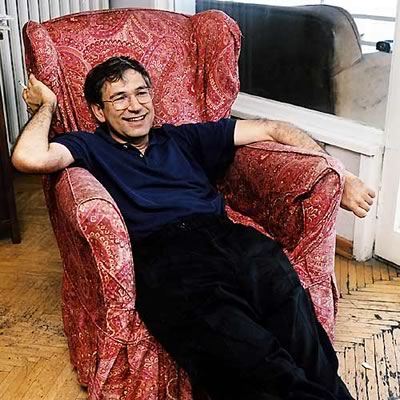|
Windows into orhan Pamuk's Hüzün |
|
|
Aesthetic deferral "Overtaxing yourself with
powerful ideas is practically a Turkish passion. For the past 200 years
this nation has rehearsed the transition from one civilization to another,
and that is a tormenting experience, I can tell you. Snow is a book
about the difficulty of living with these big, abstract ideas, of
surviving them and finding happiness. You know, I've had it up to here
with big ideas. I've been overexposed to them in my hyper-politicized
country. Literature is my reaction to this, an attempt to turn the tables,
to contribute a certain sense of humor, a certain detachment. I want to
tell the reader: don't take these things so damn seriously. Isn't life
wonderful? Pay attention to life's details! The important thing in life is
happiness and the possibility of surviving in this intolerant society
we've created. Now I've started preaching…(laughter)" Dopplegängers and other selves "There's this other person who is
always in a more genuine, more heartfelt, more hard-core place than
you," Pamuk explains. "Even his failures are more authentic. You
love him and you also want to kill him. These are my essential subjects:
rivalry, jealousy, problems of domination and influence, revenge. Crucial
but unworthy issues that come from growing up in an exclusively
competitive childhood with a brother only 18 months older than I, and also
of living on the margins of Europe. Turning around this feeling of
off-centeredness. Saying, no, I am at the center. My contribution to the
doppelgänger problem was to give it an East-West tilt." Mirrors of shifting identity "My subject, generally speaking,
is the metaphysics of change, and human reactions to what we used to have
as our identity, when the whole thing is changed. It 'doesn't' matter
whether it's east or west, or traditional or modern; you have a tradition
and, for this or that reason, it's changed. I care about that. I care
about what is lost." "East" (Past) vs. "West" (Present) "This meet of East and West and clash
of civilizations, this is unfortunately one of the most dangerous and
horrific ideas that have been produced in the last twenty years ... This fanciful idea is now unfortunately getting to be
real, and this theory is serving the clash of civilizations and the deaths
of so many people.. . .Culture is mix. Culture means a mix of things from
other sources. And my town, Istanbul, was this kind of mix. Istanbul, in
fact, and my work, is a testimony to the fact that East and West combine
cultural gracefully, or sometimes in an anarchic way came together, and
that is what we should search for. This is getting to be a good interview
by the way." The Missing Text "Of course it [The New Life] alludes to
the Third World way of reading a book. The idea that you can read
something and it will give you the secret of the universe."
|
|
